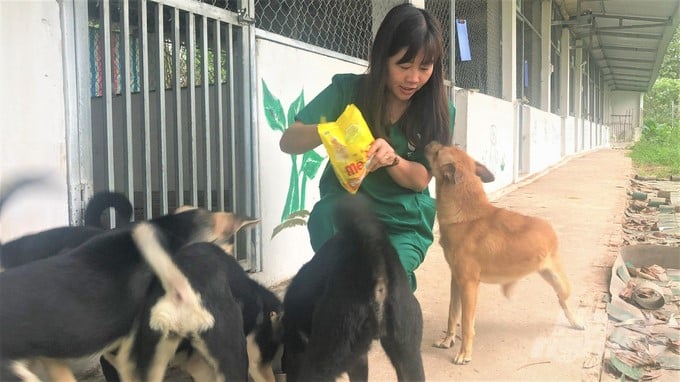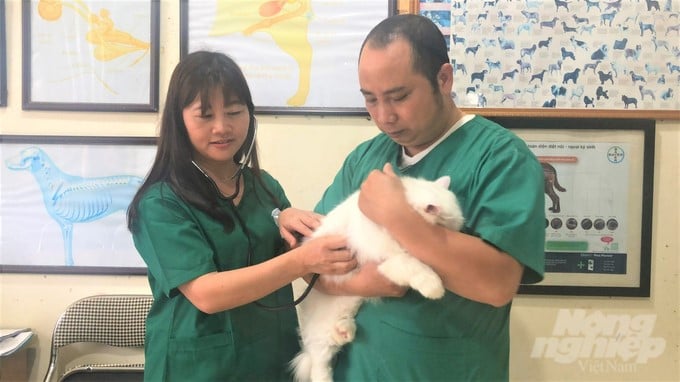November 25, 2025 | 08:13 GMT +7
November 25, 2025 | 08:13 GMT +7
Hotline: 0913.378.918
November 25, 2025 | 08:13 GMT +7
Hotline: 0913.378.918

The demand for the pet care industry in Vietnam is gradually increasing. Photo: Toan Nguyen.
In recent years, raising pets (mainly dogs, cats, and ornamental birds) in Vietnam has tended to become more and more popular, especially in developed provinces and cities.
According to statistics from Thai Nguyen University of Agriculture and Forestry (TUAF), by 2022, the country will have eight million pet dogs and two million pet cats. The pet care industry’s sales in Vietnam account for 13% (equivalent to USD 500 million) in Southeast Asia.
The more the pet care industry develops and the need for human resources expand, the scarcer and rarer veterinarians or people with high qualifications in this field become.
According to the survey data in 2022, the demand for veterinarians specializing in pets in the 2022–2027 period mainly belongs to two groups of subjects: veterinary clinics and hospitals (54%), and businesses operating in the field of animal husbandry and veterinary medicine (44%). The rest (7%) is state agencies.
In response to this practical demand, the TUAF’s Faculty of Animal Husbandry and Veterinary Medicine has developed a training program so that, after graduation, learners can perform skills in disease diagnosis, prevention, and treatment on pets or self-implement pet-specializes business models.
In 2023, TUAF will be the first unit to open a veterinary training major specializing in pets (formal system). This is a major that first appeared at training institutions in the field of animal husbandry and veterinary medicine in Vietnam.
The training program is taught for more than 4 years in the form of credits. The scope of enrollment is nationwide, and the subjects are high school graduates based on their scores in the 2023 high school graduation exam, achieving the entrance quality score determined and announced by the university in accordance with regulations.

Ms. Phan Thi Hong Phuc, Dean of Animal Husbandry and Veterinary Medicine, is examining cats at the community veterinary clinic. Photo: Toan Nguyen.
According to Mrs. Phan Thi Hong Phuc, TUAF’s Dean of Animal Husbandry and Veterinary Medicine, the opening of a pet major comes from training capacity and social needs, as well as TUAF’s mission, goals, and development orientation. The pet training program will contribute to promoting the university’s future development strategy. Thai Nguyen University of Agriculture and Forestry is putting great effort into becoming one of the leading universities in Vietnam by 2030.
"In terms of training capacity, we have a team of experienced lecturers with doctoral degrees of over 60%. The courses are taught by the university's lecturers and some leading experts in Vietnam and internationally. Students will thus gain professional knowledge, basic practical skills, and the ability to work independently in this field," said Dean Phan Thi Hong Phuc.
The graduates will have many job opportunities at veterinary clinics and hospitals, businesses operating in the field of veterinary medicine and pets, and administrative agencies at commune, ward, or higher levels, as well as educational and training institutions such as colleges and universities related to their majors.
The opening of a pet major is assessed to be in line with the TUAF’s development strategy in multi-disciplinary training. This is also a major with high practical application, creating human resources and jobs for employees and meeting the future needs of society and the market.
Translated by Huyen Vu

(VAN) ILDEX Vietnam 2026 will connect more than 250 exhibitors and 10,000 visitors from 40 countries.

(VAN) Hue City is accelerating efforts to combat IUU fishing, aiming to remove EC’s 'yellow card' and promote sustainable fisheries development.

(VAN) The recent torrential downpours and unprecedented flooding in the Southern Central Coast are a highly unusual meteorological and hydrological event.

(VAN) The Southern Central Coast and Central Highlands regions have suffered massive agricultural losses, with over 80,000 hectares of rice and crops, alongside millions of livestock, being swept away, causing severe damage to farmer livelihoods.

(VAN) Trieu Son commune deploys a 'virtual assistant' to help residents complete administrative procedures.

(VAN) Applying green technology in rural water supply and sanitation helps improve resource efficiency, protect the environment, and enhance community living standards.

(VAN) Developing biosecure livestock production is the key that helps Tuyen Quang form linked chains in livestock production and build its brand in the market.